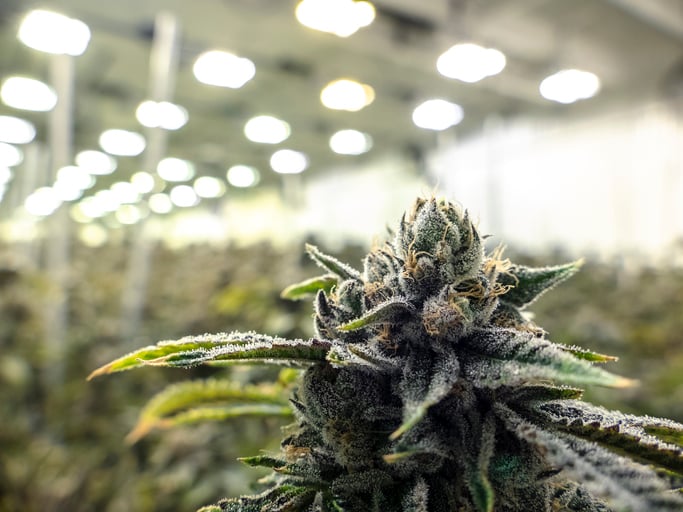Investors have rightfully focused a lot of their attention on the opportunity for Canadian cannabis producers in their home country. After all, the Canadian adult-use recreational marijuana market is driving most of the growth for these companies. In addition, the next phase of this market -- cannabis derivatives, including beverages, edibles, and vapes -- is scheduled to launch later this year.
But an even bigger long-term opportunity for Canadian cannabis producers lies in international markets. Which of these companies already claim the greatest head starts outside of Canada?

Image source: Getty Images.
1. Aphria
Aphria (APHA +0.00%) stands as the clear No. 1 Canadian cannabis producer in terms of international sales. In its fiscal fourth-quarter results announced in August, the company reported international revenue of at least 96.9 million Canadian dollars.
There's one thing you should know about Aphria's international revenue, though. The company's impressive Q4 figure came from its acquisition earlier this year of German medical cannabis and pharmaceutical distributor CC Pharma. The additional sales from this acquisition generated most of Aphria's revenue growth in the fourth quarter.
Aphria didn't report details on how much medical cannabis it sold in international markets apart from the sales contribution from CC Pharma. However, the company appears to be in good shape to profit in Germany thanks to being selected as one of three companies allowed to cultivate medical cannabis in the country.
2. Tilray
Tilray (TLRY +0.00%) certainly ranks in second place among Canadian cannabis producers based on international sales. What isn't certain, however, is exactly what the company's total international sales are.
In August, Tilray reported second-quarter international medical cannabis revenue of nearly $1.9 million. The company also announced over $19.9 million in revenue from Manitoba Harvest, a hemp foods business Tilray acquired earlier this year. The problem is that Tilray didn't give details of exactly how much of that revenue was made outside of Canada.
We can calculate a ballpark estimate, though. Tilray CEO Brendan Kennedy noted in his comments during the company's Q2 conference call that Manitoba's products are carried in roughly 16,000 stores in North America, around 13,000 of which are in the U.S. If we assume similar average sales per store and use these numbers to prorate Manitoba's total revenue in the second quarter, the subsidiary's international revenue comes to around $16.2 million. Adding that amount to Tilray's international medical cannabis sales gives a total international revenue figure of around $18.1 million.
3. Canopy Growth
Canopy Growth (CGC +0.00%) would have taken the No. 2 spot if we had limited our ranking criteria solely to international medical cannabis sales and excluded hemp sales. The big Canadian cannabis producer reported international medical cannabis revenue of CA$10.5 million in its fiscal 2020 first-quarter results announced in August.
International sales were one of the few bright spots in Canopy's otherwise horrible Q1 update. The company's international medical cannabis revenue more than quintupled the amount made in the previous sequential quarter thanks in part to higher production capacity.
However, like Aphria, Canopy Growth benefited primarily from a key acquisition. The company attributed most of its quarter-over-quarter international revenue gain to its buyout in May 2019 of C3, Europe's largest cannabinoid-focused pharmaceuticals company.
4. Aurora Cannabis
Aurora Cannabis (ACB 2.96%) hasn't yet announced its results for the quarter ending June 30, 2019. However, we can make an educated guess about the company's international medical cannabis revenue.
In May, Aurora announced international medical cannabis revenue of CA$4 million in its fiscal 2019 third quarter. Even if the company merely maintained that level of international sales, it would deserve the No. 4 spot on our list. However, it seems likely that Aurora's international sales will be much higher when the company reports its Q4 results later this month.
For one thing, Aurora's international medical cannabis sales have been growing even faster than its Canadian adult-use recreational marijuana sales. Also, the company has already provided a sneak peek at its overall Q4 sales, projecting net cannabis revenue of between CA$90 million and CA$95 million, compared to net cannabis revenue of CA$58.6 million in the previous quarter. Based on this growth rate, Aurora could report international medical cannabis sales in Q4 of at least CA$6 million.
Most likely to succeed internationally
All four of these Canadian cannabis producers seem likely to keep the momentum going in international markets. I suspect, though, that Canopy Growth is the company most likely to succeed internationally in the future.
Canopy already has a strong position in the European medical cannabis market. Its acquisition of Germany-based C3 will likely fuel more international revenue growth in the future. The company has also jumped into the U.S. hemp cannabidiol (CBD) market and expects to launch its first products later this year.
The biggest opportunity for Canopy Growth would be competing in the U.S. marijuana market. Canopy's deal to acquire U.S.-based cannabis operator Acreage Holdings puts it in a prime position to enter the lucrative U.S. market. However, the transaction can't be triggered until federal marijuana laws are revised.
This roadblock that prevents the major Canadian cannabis producers from establishing a presence in the U.S. pot market underscores one of the risks associated with investing in marijuana stocks. The sky-high valuations of several big Canadian cannabis producers reflect the expectations that they'll be able to compete in the U.S. But until federal laws are changed, those expectations won't become reality. That means international opportunities, for now, will be limited largely to Europe, Australia, Latin America, and the U.S. hemp market.







